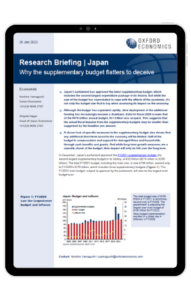Why Japan’s supplementary budget flatters to deceive

Japan’s parliament has approved the latest supplementary budget, which includes the second-largest expenditure package in its history. But while the size of the budget has skyrocketed to cope with the effects of the pandemic, it’s not only the budget size that is key when assessing its impact on the economy.
What you will learn:
- Although the budget has expanded rapidly, slow deployment of the additional funding has increasingly become a drawback. Data for fiscal 2020 reveals that of the ¥176 trillion annual budget, ¥31 trillion was unspent.
- A closer look at specific measures in the supplementary budget also shows that any additional short-term boost to the economy will be limited.
- Half of the budget is compensation and support for damaged firms and households through cash benefits and grants. And while long-term growth measures are a sizeable chunk of the budget, their impact will only be felt over the long term.
Tags:
Related Services

Post
Food prices to bottom out in 2024, risks skewed to upside
Our baseline forecast is for world food commodity prices to register an annual decline this year, in aggregate, reducing pressure on food retail prices further downstream. However, we believe the risks to this forecast are overwhelmingly skewed to the upside.
Find Out More
Post
Battery raw material prices to recover
Battery raw materials prices bottomed out last quarter and we think a sustained recovery is looming. Midstream EV battery manufacturing activity has picked up again and inventories have returned to historical levels, suggesting upstream demand for raw materials will also bounce back.
Find Out More